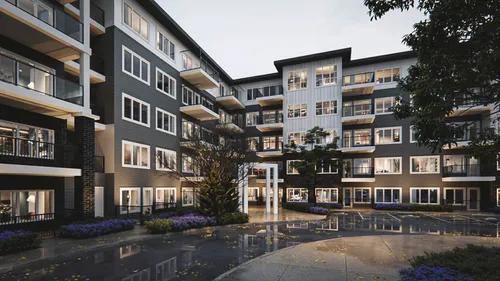Condo Vs Apartment: What’s The Difference?
February 25, 2023

When it comes to choosing a place to live, one of the biggest decisions you'll need to make is whether to go for a condo or an apartment. While the two types of properties share similarities, there are some key differences that you should be aware of before making your choice. In this article, we'll explore the difference between a condo and an apartment so you can make an informed decision.
What is a Condo?
A condo, short for "condominium," is a type of property that is similar to an apartment in terms of its layout and amenities. However, the main difference is that when you buy a condo, you own it outright, whereas when you rent an apartment, you're only renting the space for a set period of time.
Condos are typically found in multi-unit buildings or complexes, and each unit is owned by an individual rather than a landlord or property management company. As a condo owner, you're responsible for paying property taxes, insurance, and maintenance fees, as well as any repairs that need to be made to your unit.
In addition to owning the unit, condo owners also typically have access to common areas such as gyms, pools, and outdoor spaces, which are shared by all residents of the complex. Depending on the condo complex, these common areas may be included in the maintenance fees or may require an additional fee to access them.
What is an Apartment?
An apartment is a type of rental property where you rent a unit from a landlord or property management company. Apartments can be found in both high-rise buildings and smaller complexes, and the rental terms can range from short-term leases to long-term leases.
When you rent an apartment, you're typically responsible for paying rent and any utilities that are not included in the monthly rent payment. You're also responsible for keeping the unit clean and in good condition, but any repairs or maintenance issues are typically handled by the landlord or property management company.
Unlike condos, apartments generally don't offer ownership opportunities, so you don't have the option to buy the unit you're living in. However, this can be an advantage for people who don't want the responsibility of homeownership or who prefer the flexibility of being able to move without having to sell their property first.
Differences Between Condos and Apartments
While condos and apartments share some similarities, there are some key differences that you should be aware of when making your decision:
Ownership: The biggest difference between condos and apartments is ownership. Condo owners own their units outright, while apartment renters only have the right to occupy the space for a set period of time.
Responsibility: Condo owners are responsible for maintaining and repairing their units, while apartment renters typically only need to keep the unit clean and report any maintenance issues to the landlord or property management company.
Flexibility: Apartment renters have more flexibility when it comes to moving, as they only need to give notice to their landlord and can move out at the end of their lease. Condo owners may have a harder time selling their units if they need to move quickly.
Cost: Condos can be more expensive to buy than apartments to rent, but condo owners have the potential to build equity in their property and may see a return on their investment if they sell in the future.
Amenities: Both condos and apartments may offer amenities such as swimming pools, fitness centers, and outdoor spaces. However, the availability and cost of these amenities may differ between the two types of properties.
Which is Right for You?
Deciding between a condo and an apartment ultimately depends on your personal preferences and priorities. If you're looking for a long-term investment opportunity and don't mind the responsibility of homeownership, a condo may be a good choice for you. On the other hand, if you're looking for flexibility and don't want the responsibility of maintaining


